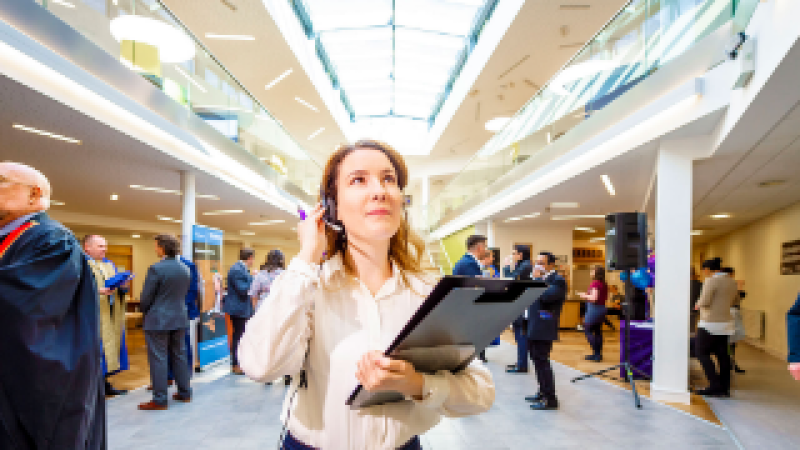Times may be tough, but they've brought us all together in unexpected ways. As we forge ahead, let’s be mindful of the good deeds and helping hands that will get us through this downturn.
In this edition of our new weekly blog series, Good Works and Great Ideas, which we publish every Friday, we’ll address how hotels are giving back during COVID-19. We’ll also take a look at ways for hospitality professionals to strengthen their relationships with planners during these tough times.
Good Works: Discover some of the ways hotels are giving back during COVID-19
1. Generating revenue and gifting future vacations to healthcare workers
To help jumpstart leisure travel, the hospitality industry has united to launch “Buy One, Give One,” a program designed to generate immediate revenue for hotels, while also showing gratitude to healthcare workers who have been tirelessly working on the front lines.
Through June 30, guests can visit the website to purchase future travel now, either at a discounted rate or otherwise incentivized. In return, participating hospitality brands and hotels will donate room nights, gift cards, or loyalty points to be distributed to medical professionals.
MMGY Global, a marketing company specializing in the travel, tourism, and hospitality industry, and the Hospitality Sales & Marketing Association International (HSMAI), partnered to launch the effort. The program has more than 30 participating hospitality brands and hotels.
2. Hoteliers using F&B for revenue and outreach opportunities
Some hoteliers are using food and beverage in creative ways to build revenue, marketing, and even public relations opportunities. Hotel restaurants, rather than shutting down, are connecting with their local communities and offering carryout and delivery options.
For Bill Nassikas, president and COO of Westroc Hospitality, keeping Westroc’s three Phoenix-area independent hotels open is more of an investment in the future.
“We’ve gone from a service business to a support business,” he said of Westroc pivoting to carryout and delivery. “We might be better closing from a pure financial position, but there are intangibles, and our hotels play a role in the community.”
Some hotels are partnering with GrubHub and Postmates for delivery, and some hotel employees are offering free delivery to the immediate area — another way to strengthen local connections. Salish Lodge & Spa, located in Snoqualmie, Washington, also offers a grab-and-go cart in the front of the hotel to facilitate easy and safe walk-up business from locals.
Nassikas said keeping F&B running now is one way to ensure a smoother transition to more typical business: “We like to think there’s an economic benefit, but at the end of the day, it’s keeping the engine running for us so that when things do start to come back, we can be ahead of the curve, at least as far as having some staff here to re-energize the hotel.”
Many hotels, in addition to shifting the way they do F&B, are also using this as an opportunity to donate food to local charities and furloughed employees. Hotel Valley Ho has a standing partnership with Ronald McDonald House and made food and supplies donations. Now, the hotel donates a percentage of its F&B sales to the charity. The Hilton Colon Guayaquil donates to healthcare professionals through a foundation called Manos por la Vida (Hands for Life), and Salish Lodge & Spa donated to the FareStart food bank in Seattle.
If you’d like to consider doing something similar at your hotel, the first step is deciding if pivoting to carryout and delivery is doable. Can you adapt current menu items, service standards, and staffing to accommodate this? Think of creative ways that you can revise your menu and create fun packages, like “date night dinners” or family-style offerings.
Learn more about how you can prepare for the industry's restart
Great Ideas: How to be the best hospitality partner to event planners
1. Get your venue certified for cleaning protocol
Planners and attendees are eager for in-person meetings to pick back up, but hesitations around safety and cleanliness are top of mind, and will continue to remain so. In order to assure planners and guests of your venue’s cleaning protocol and standards, consider investing time and resources in gaining a certification. For example, certification programs like the one from the Global BioRisk Advisory Council, a division of the worldwide cleaning industry association ISSA, could help the industry safely resume face-to-face events and assuage attendee concerns.
The GBAC Star program, created by scientists who have consulted with the Centers for Disease Control and Prevention, teaches venue cleaning personnel how to prepare for and respond to infectious diseases and other biohazards. Protocols tailored for hotels and convention centers are updated regularly. The program will serve as a third-party validation that the facilities are implementing the industry’s highest cleaning standards and are safe for guests and events.
"Having the GBAC Star program is kind of like having a universal seal of approval that a facility is subscribing to the highest standards in the industry and they've been prescribed by infectious disease control experts,” said Richard Simon, CEO of United Service Companies, which has been working closely with GBAC and ISSA on the new sanitization standards.
Hyatt is the first hotel brand to sign on for the accreditation program, and the Hard Rock Stadium in Miami Garden, Fla. has joined, too. Simon expects more venues, hotels, and industry associations to join in the coming weeks. Cities that have a convention center and multiple hotels and venues that have been GBAC certified will likely attract more meeting planners, especially in the early stages of resuming face-to-face events.
2. Pivot to virtual: Technology tools for virtual site tours
According to a Northstar Meetings Group poll, 70 percent of planners are rescheduling their event for later in 2020, rather than moving to 2021. It also shows that 40 percent of event planners who are still working are currently sourcing and booking events. Meanwhile, 30 percent are not booking at this time, but are researching for future events.
There are many options for tools and platforms that provide video tours and website integrations so venues can connect with planners who are sourcing and vetting venues from home. Northstar Meetings Group provides a longer list of CVBs and hotels that offer virtual tours and how they’re pivoting to virtual to connect with planners.
Here are a couple of examples of tools that hotels are using to interface with planners and facilitate tours and bookings during this time.
Matterport 3D walkthroughs
Tools like Matterport equip venues with the ability to provide 3D walkthroughs — which go above and beyond photos and 360-degree video. With 3D walkthroughs, planners know exactly how the space will look in real-life. You can embed the 3D space right on your website, or publish to Google Street View and give planners the tour, straight from Google Search. According to Matterport metrics, its 3D walkthroughs have the potential to increase web engagement by as much as 15% and conversation to bookings by as much as 14%.
3D walkthroughs can help in the booking process by allowing planners to easily share the property and space with other stakeholders and solicit their feedback without having to do a site visit. It’s also an easy way to narrow down on your qualified leads. Since planners can put themselves right in the space, they can tell immediately if the property is the right fit for their event. It even allows users to measure distances with a virtual tape measure.
Realync virtual tours
Realync is another video marketing tool hoteliers can use to provide virtual tours and connect with planners as they’re sourcing for future events. In response to travel restrictions and other changes brought about by COVID-19, The Hotel at the University of Maryland – a luxury hotel and conference center – launched Realync and other digital solutions to provide clients with tools to virtually experience and interact with its properties and event spaces.
Realync allows for creating pre-recorded video tours right on your smartphone and customizing them with voiceovers. Hoteliers can also use this technology for live video tours that can either be conducted personally with each planner or integrated with your website for widespread use and viewing. This particular tool also comes with an analytics dashboard so you can test and track how your video content performs, and capture information about who is watching your videos.
Now you know how hotels are giving back during COVID-19 — and how to strengthen hotelier-planner relationships moving forward
For more good works and great ideas, check out last week’s post, which focuses on how wedding venues are helping couples during COVID-19. And be sure to check back next Friday for the latest edition of this series.





